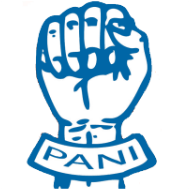PANI Newsletter Volume 01. No. 3, July- October 2023
CHIEF FUNCTIONARY’S CORNER
Climate change, marked by rising temperatures, altered weather patterns, and intensified extreme events, jeopardizes diverse sectors, none more than agriculture. These challenges not only threaten agricultural productivity but also aggravate existing gender inequalities, placing additional burdens on women farmers. As per the Annual Periodic Labor Force Survey (PLFS) Report 2022-23, agriculture had the highest estimated percentage distribution of female workers, i.e. 64.3 %, with 76.2 % in rural areas and 11.7 % in urban areas. Studies have shown that women are increasingly being seen as more vulnerable than men to the impacts of climate change. In the case of India, this is even more stark given that household responsibilities, which are climate sensitive, largely fall on women such as, collection of water, firewood, and fodder as well as ensuring food security for families. Despite these challenges, women in agriculture and allied areas demonstrate remarkable resilience, resourcefulness, and innovation. PANI recognizes that by investing in women’s education, access to resources, agency, and entrepreneurship opportunities, we can foster more resilient and inclusive agricultural systems that benefit communities, economies, and the planet.
Further, women in rural India are typically responsible for the nutrition and well-being of their families. However, limited access to education, healthcare, and economic opportunities often exacerbates the challenges they face in providing adequate nutrition for themselves and their children. Therefore, PANI with our funding partners recognize the importance of empowering women to become agents of change in their communities. By implementing nutrition interventions that specifically target women, we aim to address the root causes of malnutrition and improve overall health outcomes.
In the last quarter, PANI team commemorated International Women’s Day across all project locations to reflect on the incredible contributions and achievements of women. Further, in this issue of Spandan, we spotlight initiatives and stories that highlight the importance of empowering women in agriculture, nutrition and micro-entrepreneurship to confront the challenges of climate change and related economic insecurities.
Hope you find SPANDAN an interesting read!
Regards,
Bharat Bhushan
Chief Functionary
People’s Action for National Integration (PANI)
Recent Significant Developments
Launch of “SPLASH”, a book that unveils PANI’s groundbreaking work for adolescent girls in rural India
Amidst the bustling aisles of the Delhi Book Fair 2024, a significant literary event unfolded on 16th February 2024, as PANI proudly launched the book titled ‘Hilor’ (Hindi) and ‘Splash’ (English), depicting stories of 25 adolescent girls oriented and trained under PANI’s Flagship Programme “Empowering Adolescent Girls” in Tarun Block, Ayodhya district of Uttar Pradesh. The book is a collection of stories of struggle and success made by adolescent girls to move beyond the societal norms and restrictions of rural Indian society. The book is available on Amazon, where it has received an overwhelming response.


The book was also launched in Tarun Block, on 26th February 2024 amidst 575 members of the community, including adolescents and teenage girls, parents, service providers, village heads and other stakeholders.
Making waves for climate action
PANI recently celebrated the successful completion of the transformative project Sustainable solutions for water efficient; economically rewarding agriculture for small farmers in East UP – SWERA. PANI had been implementing this project from the year 2021 in six blocks (Rehra Bazar, Utraulla, Sridattganj, Balrampur, Tulsipur & Gainsari) of Balrampur district in Uttar Pradesh.

The project aimed at creating climate adaptive sustainable solutions in agriculture to improve livelihoods and conserve natural resources. During the course of the project, a cadre of 300 young women from within the target blocks were trained as sustainable agriculture professionals named as Community Resource Persons (CRPs). These CRPs trained over 70,000 farmers on sustainable and water-efficient agricultural techniques. As a result of adopting such techniques, by the end of the project (31st January 2024), we contributed to save 279 billion liters of water, increased yield of 813,011 tons of agricultural output resulting in additional income of around INR 455.88 crores for target farmers.
Based on the success of SWERA project, the funding partners have signed up PANI for next phase of the program, extending the interventions across seven additional blocks (Jhanjhri, Mankapur, Chhapiya, Itiyathok, Rupaideeh Mujhena, & Pandri Kripal) of Gonda district and one block (Ikauna) of Shravasti district. This new initiative is named as “Developing Adaptive Capacity to Climate and Water Security Risks for small and marginal farmers in Eastern UP” – DACCWSR. The program aims to bolster the resilience of agricultural livelihoods and ensure sustainable water resource management in the face of climate change impacts. This will be achieved through: capacity building of farmers and adoption of climate-resilient crop varieties with sustainable agricultural practices; promoting efficient water management approaches suitable for evolving climatic conditions; fostering behavioral change through community engagement, capacity building, and raising awareness on climate risks and mitigation strategies.
PANI believes that with climate change posing an escalating threat to rural livelihoods, such initiatives could pave the way for food secure and resilient communities.
हर डगर हर नगर - Project activities
I. Youth Festival and Sports events organized under Empowering Adolescent Girls (EAG) Program:
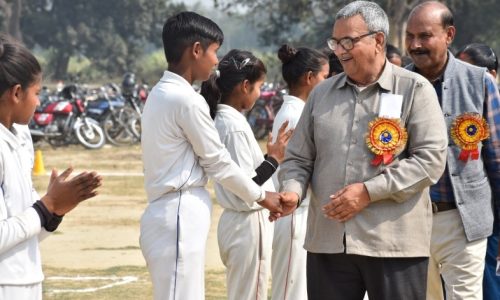
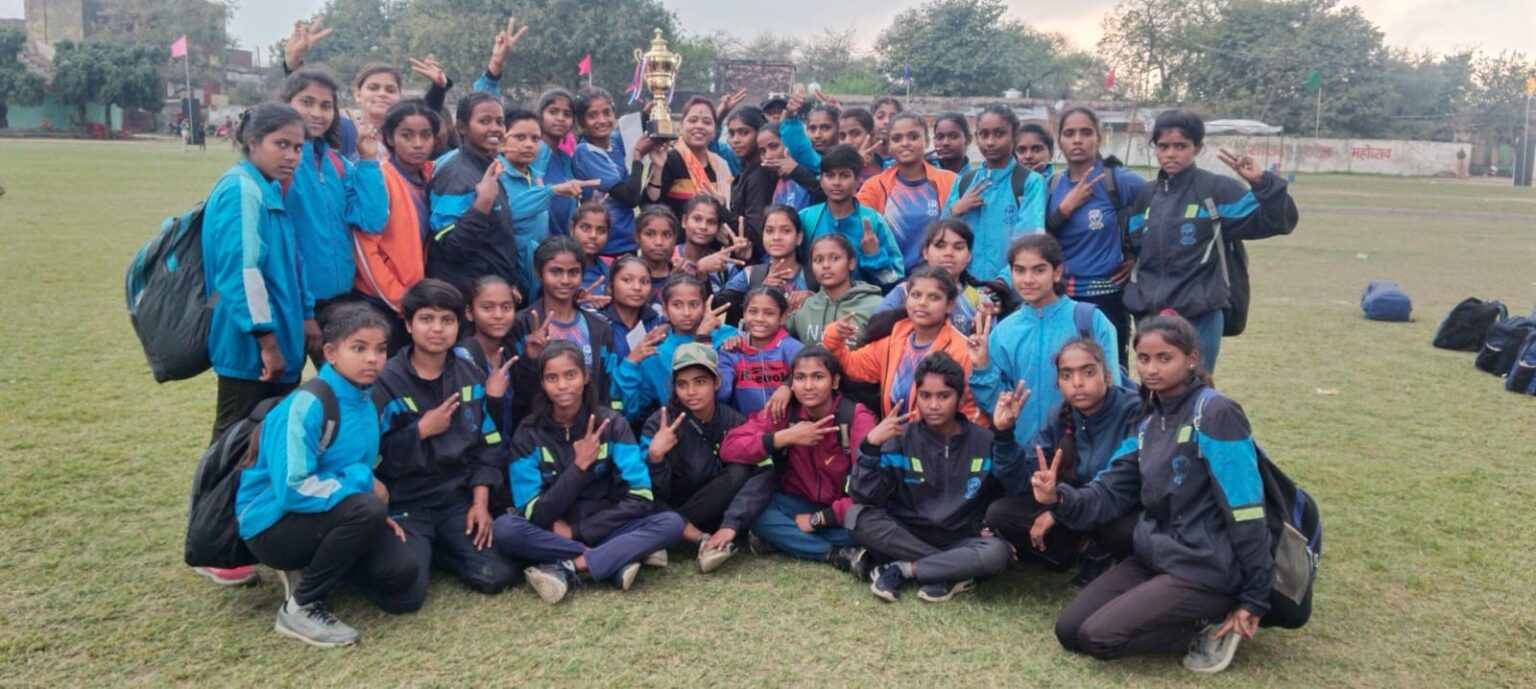
Another similar event, Women Sports Prize Money Competition in Kabaddi was organized from 1st March to 3rd March 2024 at Maqbara Stadium, Ayodhya. During this event, Tarun team (EAG Program) won the first position by defeating the team of Dr. Bhimrao Ambedkar Stadium, Ayodhya. The winning team was presented a trophy and awarded a cash prize of INR 15,000. Girls who were part of the team as well as other girls who are part of EAG program enthusiastically attended the event. PANI believes that participation in sports events can empower young girls by providing opportunities to develop leadership skills, teamwork, and self-confidence. Therefore, organizing such sports events is one of PANI’s key strategic initiatives to challenge traditional gender norms and empower women to pursue their passions and aspirations. Moreover, with such events we try to bring communities together, promote social inclusion, and create a sense of belonging among adolescent girls.
II. International Women’s Day celebrated under PANI’s various programs - Empowering Adolescent Girls (EAG), Sustainable Advancement for Rural and Agriculture Livelihood (SARAL)and Initiative for Sustainable Livelihood Development (ISLD).
 Similar celebration was organized by PANI in Bansi, Barhani, and Itwa blocks of Siddharthnagar district under PANI’s project – “Sustainable Advancement for Rural and Agriculture Livelihood” (SARAL-SDR) on 9th March 2024 to spotlight women’s pivotal role in agriculture and rural development while fostering empowerment and gender equality. Under this project, PANI is collaboratively working across 150 Gram Panchayats of Three blocks- namely, Itwa, Bansi and Badni in Siddharthnagar district, Uttar Pradesh to improve the livelihood condition of 30,000 farmer households by building farmers’ capacities in sustainable agricultural practices.
Another series of events was organized on 4th March 2024 at Vikas Vidyalay Sohna Bhanwapur Block and 5th March 2024 at Government Inter College Kudi Dumariyaganj to celebrate the International Women’s Day by project team of “Initiative for Sustainable Livelihood Development” (ISLD). 714 participants including Government teachers, Krishi Vigyan Kendra (KVK) scientists, Women’s Police Dumariyaganj (Sub inspector), Medical Officers, Gram Pradhans, students and members of Mahila Kisan Sangathan attended the event. The Government Inter Collage teachers spoke about the importance of education and bridging the gender gap in the society by equal treatment to daughters and sons. The KVK representative shared information about the schemes being run by Indian government to support women and also emphasized on the importance of technology in Natural Resource Management, especially, responsible use of water, soil and various ways to conserve them for the future. Dumariyaganj Sub Inspector (SI) Ms. Meera Chauhan inspired the girls and women to come forward in their contribution as responsible citizens of the country.
Similar celebration was organized by PANI in Bansi, Barhani, and Itwa blocks of Siddharthnagar district under PANI’s project – “Sustainable Advancement for Rural and Agriculture Livelihood” (SARAL-SDR) on 9th March 2024 to spotlight women’s pivotal role in agriculture and rural development while fostering empowerment and gender equality. Under this project, PANI is collaboratively working across 150 Gram Panchayats of Three blocks- namely, Itwa, Bansi and Badni in Siddharthnagar district, Uttar Pradesh to improve the livelihood condition of 30,000 farmer households by building farmers’ capacities in sustainable agricultural practices.
Another series of events was organized on 4th March 2024 at Vikas Vidyalay Sohna Bhanwapur Block and 5th March 2024 at Government Inter College Kudi Dumariyaganj to celebrate the International Women’s Day by project team of “Initiative for Sustainable Livelihood Development” (ISLD). 714 participants including Government teachers, Krishi Vigyan Kendra (KVK) scientists, Women’s Police Dumariyaganj (Sub inspector), Medical Officers, Gram Pradhans, students and members of Mahila Kisan Sangathan attended the event. The Government Inter Collage teachers spoke about the importance of education and bridging the gender gap in the society by equal treatment to daughters and sons. The KVK representative shared information about the schemes being run by Indian government to support women and also emphasized on the importance of technology in Natural Resource Management, especially, responsible use of water, soil and various ways to conserve them for the future. Dumariyaganj Sub Inspector (SI) Ms. Meera Chauhan inspired the girls and women to come forward in their contribution as responsible citizens of the country.
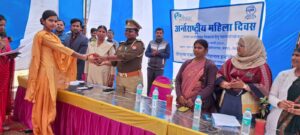 Under the ISLD project, PANI trains a cadre of Community Resource Persons (CRPs), who are invariably adolescent girls and young women, at village level to work towards rural development collaboratively with the community. During the women’s day celebrations, 10 CRPs were also recognized for their extraordinary efforts in rural development work under ISLD project. These girls have emerged as “Role Models” for other girls of the community.
The celebration of International women’s day provided us with an opportunity to bring together diverse stakeholders, including women, men, youth, community leaders, and organizations, to collectively celebrate and advocate for gender equality.
Under the ISLD project, PANI trains a cadre of Community Resource Persons (CRPs), who are invariably adolescent girls and young women, at village level to work towards rural development collaboratively with the community. During the women’s day celebrations, 10 CRPs were also recognized for their extraordinary efforts in rural development work under ISLD project. These girls have emerged as “Role Models” for other girls of the community.
The celebration of International women’s day provided us with an opportunity to bring together diverse stakeholders, including women, men, youth, community leaders, and organizations, to collectively celebrate and advocate for gender equality. III. "Empowering Communities for Food Security and Nutrition”: PANI's Recent Initiatives under Advancing Food Security and Nutrition (AFSN) project in Manikpur Block, Chitrakoot
AFSN project is being implemented by PANI in collaboration with Oracle CSR in 25-gram panchayats of Manikpur block, Chitrakoot district, Uttar Pradesh. It is a comprehensive initiative designed to address the food security and nutritional needs of the local community. Recent direct support initiatives undertaken in the project are:
A. Distribution of cookware & utensils to government schools’ kitchen to cook and serve mid-day meal with adequate hygienic and nutritional practices:


B. Educating and empowering women through “Nutrition Awareness” drives -
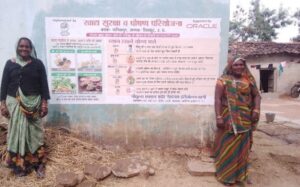 Malnutrition remains a significant challenge in rural India, affecting millions of lives, especially among women and children. Limited access to nutritious food, lack of awareness about balanced diets, and prevailing socio-economic factors exacerbate this issue, leading to long-term health consequences. To address this pressing issue, in the month of February 2024, multiple nutrition awareness drives were hosted by PANI in Manikpur block of Chitrakoot district in Uttar Pradesh. Three cluster-level nutrition awareness events were hosted from 1st February to 6th February, and another grant event at Pakauaa Devi Sanskrit Mhavidhyalaya was hosted on 9th February 2024, aimed to raise awareness about nutrition and food security among residents,
Malnutrition remains a significant challenge in rural India, affecting millions of lives, especially among women and children. Limited access to nutritious food, lack of awareness about balanced diets, and prevailing socio-economic factors exacerbate this issue, leading to long-term health consequences. To address this pressing issue, in the month of February 2024, multiple nutrition awareness drives were hosted by PANI in Manikpur block of Chitrakoot district in Uttar Pradesh. Three cluster-level nutrition awareness events were hosted from 1st February to 6th February, and another grant event at Pakauaa Devi Sanskrit Mhavidhyalaya was hosted on 9th February 2024, aimed to raise awareness about nutrition and food security among residents,  particularly women. Over 2,000 women from over 25-gram panchayats participated across these events. The events included interactive sessions, Poshan Thali (Nutritious food and balanced diet) demonstrations, nutrition guidance, community engagement forums, role-plays, and cultural performances. Interactive sessions focused on balanced nutrition and dietary diversity, emphasizing the importance of nutrition for overall health. Practical demonstrations showcased locally available ingredients to encourage healthier dietary practices. Many women were recognized as “Nutrition Champions” for promoting healthy eating practices among the community. By empowering individuals and fostering community engagement, such nutrition drives at GP level aimed not only to educate but also to empower individuals to make informed choices regarding their nutrition and health.
particularly women. Over 2,000 women from over 25-gram panchayats participated across these events. The events included interactive sessions, Poshan Thali (Nutritious food and balanced diet) demonstrations, nutrition guidance, community engagement forums, role-plays, and cultural performances. Interactive sessions focused on balanced nutrition and dietary diversity, emphasizing the importance of nutrition for overall health. Practical demonstrations showcased locally available ingredients to encourage healthier dietary practices. Many women were recognized as “Nutrition Champions” for promoting healthy eating practices among the community. By empowering individuals and fostering community engagement, such nutrition drives at GP level aimed not only to educate but also to empower individuals to make informed choices regarding their nutrition and health. 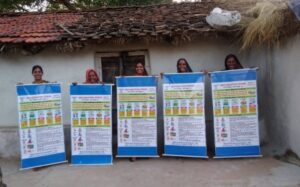 Under the same initiative, 100 wall paintings (Digital Pastings) were strategically placed in high-traffic areas across 25-gram panchayats and large-size posters were distributed, which will work as educational tools to advocate for healthier dietary practices, importance of balanced diets, locally available nutritious foods, and dietary recommendations for pregnant women and children. Contact information for local nutrition resources was also printed on the paintings and posters. Needless to say, such targeted nutrition interventions focused on women drive generational progress against deeply-rooted health and development challenges. As economies and policies evolve, these grassroots initiatives are slowly sowing seeds of empowerment and sparking revolutions from a household level.
Under the same initiative, 100 wall paintings (Digital Pastings) were strategically placed in high-traffic areas across 25-gram panchayats and large-size posters were distributed, which will work as educational tools to advocate for healthier dietary practices, importance of balanced diets, locally available nutritious foods, and dietary recommendations for pregnant women and children. Contact information for local nutrition resources was also printed on the paintings and posters. Needless to say, such targeted nutrition interventions focused on women drive generational progress against deeply-rooted health and development challenges. As economies and policies evolve, these grassroots initiatives are slowly sowing seeds of empowerment and sparking revolutions from a household level. IV. District-Level workshop for Building Climate Change Resilience through Entitlements (BCCRE), Siddharthnagar
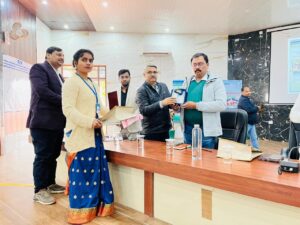 Under the project, a consultative workshop was organized on 16th February 2024 at Dr. Ambedkar Auditorium, Vikas Bhawan, in Siddharthnagar district with support from district administration. Shri. Jyanendra Kumar, Chief Development Officer (CDO), Shri. Gopal Prasad Kushwaha, District Development Officer (DDO), were the guests of honor accompanied by Shri. Ravi Shankar Pandey, Soil Conservation Officer and Shri Vivek Kumar Dubey, Plant Protection Officer.
Under the project, a consultative workshop was organized on 16th February 2024 at Dr. Ambedkar Auditorium, Vikas Bhawan, in Siddharthnagar district with support from district administration. Shri. Jyanendra Kumar, Chief Development Officer (CDO), Shri. Gopal Prasad Kushwaha, District Development Officer (DDO), were the guests of honor accompanied by Shri. Ravi Shankar Pandey, Soil Conservation Officer and Shri Vivek Kumar Dubey, Plant Protection Officer.  The objectives of the workshop were to collectively deliberate with all stakeholders over the issue of climate change, adverse effects of climate change on various facets of community such as livelihood, health, education and hygiene conditions; highlight PANI’s interventions under current project in building citizens’ resilience against climate change and climatic risks by linking them to government’s entitlements; bringing to fore the success stories of numerous beneficiaries who have got benefits under government schemes/ subsidy programs under the project. The project was initiated in July 2022 and till date, PANI has already linked over 5,000 farmers to various government schemes and over 300 young men and women have been provided with entrepreneurship opportunities to set-up their clean energy business. The workshop facilitated a panel discussion where experts from NGOs, CSOs, and district administration deliberated over the challenges in uptake of climate-related schemes and mitigation mechanisms. The panel also shared inputs to carve a roadmap ahead to understand how Government’s entitlements can better support the community in building resilience against climatic risks. The workshop was attended by over 75 participants. The district administrative officials at Siddharthnagar appreciated PANI team’s efforts on the project and extended their co-operation for smooth functioning of project activities.
The objectives of the workshop were to collectively deliberate with all stakeholders over the issue of climate change, adverse effects of climate change on various facets of community such as livelihood, health, education and hygiene conditions; highlight PANI’s interventions under current project in building citizens’ resilience against climate change and climatic risks by linking them to government’s entitlements; bringing to fore the success stories of numerous beneficiaries who have got benefits under government schemes/ subsidy programs under the project. The project was initiated in July 2022 and till date, PANI has already linked over 5,000 farmers to various government schemes and over 300 young men and women have been provided with entrepreneurship opportunities to set-up their clean energy business. The workshop facilitated a panel discussion where experts from NGOs, CSOs, and district administration deliberated over the challenges in uptake of climate-related schemes and mitigation mechanisms. The panel also shared inputs to carve a roadmap ahead to understand how Government’s entitlements can better support the community in building resilience against climatic risks. The workshop was attended by over 75 participants. The district administrative officials at Siddharthnagar appreciated PANI team’s efforts on the project and extended their co-operation for smooth functioning of project activities. V. District-level workshop under ISA Chitrakoot:
 Initiative for Sustainable Agriculture (ISA) project is being implemented by PANI in 50 villages of total 46 gram panchayats of block Karwi, Pahadi and Manikpur in district Chitrakoot, Uttar Pradesh. The project aims at increasing farmers’ income and reducing cost of cultivation. Under the project, the project team builds farmers’ capacity on sustainable agriculture practices through Farmers’ Field Schools (FFS), promote natural farming, agricultural mechanization, etc.
Initiative for Sustainable Agriculture (ISA) project is being implemented by PANI in 50 villages of total 46 gram panchayats of block Karwi, Pahadi and Manikpur in district Chitrakoot, Uttar Pradesh. The project aims at increasing farmers’ income and reducing cost of cultivation. Under the project, the project team builds farmers’ capacity on sustainable agriculture practices through Farmers’ Field Schools (FFS), promote natural farming, agricultural mechanization, etc.
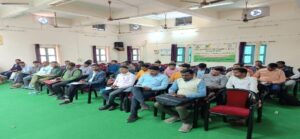 Under the Aspirational District Program of NITI Aayog, a one-day district level workshops on Agricultural Development Framework were organized by ITC Mission “Sunehra Kal” in association with PANI on 20th February 2024 in Chitrakoot and similar workshop also conducted on 14th March 2024 in Sonbhadra district. The workshop at Chitrakoot was conducted under the chairmanship of the District Agriculture Officer and attended by Agriculture Development Officer (ADO), Block Technical Manager (BTM), Technical Agriculture Assistant (TAC), Agricultural Technical Manager (ATM), officers from Agriculture Department, scientists from Krishi Vigyan Kendra and Dhanesh Garg, Program officer from ITC. The workshops aimed at disseminating PANI’s key initiatives in enhancing agricultural framework for farmers.
Under the Aspirational District Program of NITI Aayog, a one-day district level workshops on Agricultural Development Framework were organized by ITC Mission “Sunehra Kal” in association with PANI on 20th February 2024 in Chitrakoot and similar workshop also conducted on 14th March 2024 in Sonbhadra district. The workshop at Chitrakoot was conducted under the chairmanship of the District Agriculture Officer and attended by Agriculture Development Officer (ADO), Block Technical Manager (BTM), Technical Agriculture Assistant (TAC), Agricultural Technical Manager (ATM), officers from Agriculture Department, scientists from Krishi Vigyan Kendra and Dhanesh Garg, Program officer from ITC. The workshops aimed at disseminating PANI’s key initiatives in enhancing agricultural framework for farmers.  The team promotes specific Package of Practices (PoPs) to be disseminated to farmers through master trainers such as Agriculture Development officers who work with farmers collaboratively in adoption of the practices to help them reduce cost of cultivation and increase incomes. The administrative officials appreciated and recognized PANI’s efforts for farmer community and have requested the team to extend their interventions in additional districts as well.
The team promotes specific Package of Practices (PoPs) to be disseminated to farmers through master trainers such as Agriculture Development officers who work with farmers collaboratively in adoption of the practices to help them reduce cost of cultivation and increase incomes. The administrative officials appreciated and recognized PANI’s efforts for farmer community and have requested the team to extend their interventions in additional districts as well. VI. Digital Literacy sessions for women in Agra and Etah districts:
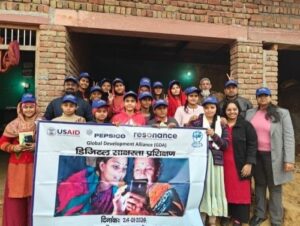 PANI is conducting a project named “Investing in Women to Strengthen Supply Chain”, in 17 blocks in seven districts of Western Uttar Pradesh – Agra, Bulandshahr, Hathras, Mathura, Etah and Aligarh, Firozabad. The project aims to link the farmers in the region with various social and economic security schemes by Government of India. The project team has till date supported over 500 citizens, especially women, to be linked with various government schemes as per their eligibility such as PM-KUSUM, Ayushman Bharat, BOCW Labour Card, Kanya Sumangla Yojana etc. The focus of this project is to empower women through government schemes as well as impart digital literacy skills so they become independent and are aware of use of digital devices.
PANI is conducting a project named “Investing in Women to Strengthen Supply Chain”, in 17 blocks in seven districts of Western Uttar Pradesh – Agra, Bulandshahr, Hathras, Mathura, Etah and Aligarh, Firozabad. The project aims to link the farmers in the region with various social and economic security schemes by Government of India. The project team has till date supported over 500 citizens, especially women, to be linked with various government schemes as per their eligibility such as PM-KUSUM, Ayushman Bharat, BOCW Labour Card, Kanya Sumangla Yojana etc. The focus of this project is to empower women through government schemes as well as impart digital literacy skills so they become independent and are aware of use of digital devices.  Therefore, to impart these skills, the project team conducted a digital literacy training session for women farmers and agri-labourers at Ardaya and Maihki Khurd village in Agra and Etah district, respectively on 24th-25th January 2024. A total of 30 young women participated in these sessions where training modules customized for target population were disseminated. The trainers oriented them on key points of using Smartphone for mobile/ Internet banking and also trained them on key aspects of financial literacy. PANI believes that digital literacy enables women to engage in civic participation and advocacy efforts. With appropriate skills to use digital tools, they can access government services, participate in online forums, and stay informed about local and national issues. This can empower the women to voice their concerns, advocate for their rights, and participate in decision-making processes that affect their communities.
Therefore, to impart these skills, the project team conducted a digital literacy training session for women farmers and agri-labourers at Ardaya and Maihki Khurd village in Agra and Etah district, respectively on 24th-25th January 2024. A total of 30 young women participated in these sessions where training modules customized for target population were disseminated. The trainers oriented them on key points of using Smartphone for mobile/ Internet banking and also trained them on key aspects of financial literacy. PANI believes that digital literacy enables women to engage in civic participation and advocacy efforts. With appropriate skills to use digital tools, they can access government services, participate in online forums, and stay informed about local and national issues. This can empower the women to voice their concerns, advocate for their rights, and participate in decision-making processes that affect their communities.
Under the same initiative, the funding partner’s team from United States of America, visited the project location on 27th March 2024. They interacted with beneficiaries and tried to delve into their experience with government entitlements and impact that is foreseen through linkage to these schemes, especially for women farmers and laborers.
Setting up Agri-tool banks to transform agriculture:  PANI is conducting Focus Rural Development Program (FRDP) in 25 villages of Gaindas Bujurg block in Balrampur district of Uttar Pradesh which aims at water conservation in agricultural activities by training the farmer community as well as dissemination of best practices to help increase farmers’ incomes. Under this project, from January- March 2024, PANI team has set up agri-tool banks across 10 villages. The advanced equipment such as zero tillage, seed cum fertilizer drill, agriculture sprayer and potato planter has been provided on nominal rent and regulated through the Farmers Development Committees (FDCs) formed in the villages. These FDCs comprise of elected representatives from among the farmers’ community, who oversee the operations of the tool bank. This democratic structure ensures that decisions regarding resource allocation, maintenance, and usage are made in consultation with the farmers. By sharing the mechanized equipment provided to farmers on rotation basis as per demand, farmers can access high-quality equipment without bearing the full financial burden. This cost-effective model promotes inclusivity and ensures that even the most vulnerable members of rural communities can benefit from modern agricultural practices. With access to the right tools, farmers can streamline their operations and achieve greater efficiency in every aspect of farming. Whether it’s land preparation, planting, irrigation, or harvesting, the use of appropriate machinery from agri-tool banks minimizes labor, saves time, and maximizes output. As farmers witness improvements in their agricultural productivity and incomes, they are likely to reinvest back into their communities, stimulating local economies and fostering social cohesion. Moreover, we believe that this initiative has the potential to create employment opportunities, particularly for rural youth engaged in agri-entrepreneurship.
PANI is conducting Focus Rural Development Program (FRDP) in 25 villages of Gaindas Bujurg block in Balrampur district of Uttar Pradesh which aims at water conservation in agricultural activities by training the farmer community as well as dissemination of best practices to help increase farmers’ incomes. Under this project, from January- March 2024, PANI team has set up agri-tool banks across 10 villages. The advanced equipment such as zero tillage, seed cum fertilizer drill, agriculture sprayer and potato planter has been provided on nominal rent and regulated through the Farmers Development Committees (FDCs) formed in the villages. These FDCs comprise of elected representatives from among the farmers’ community, who oversee the operations of the tool bank. This democratic structure ensures that decisions regarding resource allocation, maintenance, and usage are made in consultation with the farmers. By sharing the mechanized equipment provided to farmers on rotation basis as per demand, farmers can access high-quality equipment without bearing the full financial burden. This cost-effective model promotes inclusivity and ensures that even the most vulnerable members of rural communities can benefit from modern agricultural practices. With access to the right tools, farmers can streamline their operations and achieve greater efficiency in every aspect of farming. Whether it’s land preparation, planting, irrigation, or harvesting, the use of appropriate machinery from agri-tool banks minimizes labor, saves time, and maximizes output. As farmers witness improvements in their agricultural productivity and incomes, they are likely to reinvest back into their communities, stimulating local economies and fostering social cohesion. Moreover, we believe that this initiative has the potential to create employment opportunities, particularly for rural youth engaged in agri-entrepreneurship.
सफलता के नए आयाम - Success Stories
"I never dreamed about success. I worked for it.":
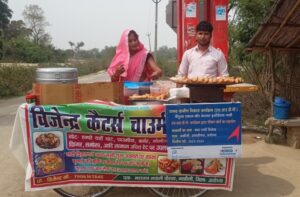 Empowering women through Micro-entrepreneurship Rupa, lives with her husband, Vijendra, and their two children in Amaniganj, also known as Khandasa, one of the backward and less developed villages in Ayodhya district of U.P. The family’s sole source of income used to depend on her husband, who works as a helper in a local electronics shop. During wedding seasons, he earns approximately INR 4,000-5,000 per month, but in off-seasons, the income dwindles. Observing her husband’s challenges, Rupa was determined to contribute to family income.
Empowering women through Micro-entrepreneurship Rupa, lives with her husband, Vijendra, and their two children in Amaniganj, also known as Khandasa, one of the backward and less developed villages in Ayodhya district of U.P. The family’s sole source of income used to depend on her husband, who works as a helper in a local electronics shop. During wedding seasons, he earns approximately INR 4,000-5,000 per month, but in off-seasons, the income dwindles. Observing her husband’s challenges, Rupa was determined to contribute to family income. 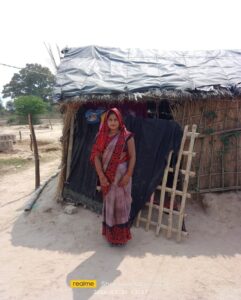 She has been a member of the Women’s Social Collective Group (WSCG), established under PANI’s Holistic Rural Development Program (HRDP), supported by HDFC CSR Parivartan. At one of the WSCG meetings, which are periodically conducted by PANI, PANI team was sharing opportunities and ideas to set up micro-businesses such as vending carts. Rupa learnt about the opportunity and shared her idea of selling fast food through vending cart. Consequently, PANI provided her with the necessary funds and guidance for launching her business based on a business plan jointly prepared with Rupa. Rupa commenced her business in February 2024, and is now earning an average income of INR 400-500 per day or approximately INR 12,000-14,000 per month, thereby significantly supporting her family’s finances. This success has fueled Rupa’s motivation, granting her a newfound sense of identity and independence.
Similar to Rupa, the program extended its support to 50 other women in the last quarter to set up their micro-business and earn a decent livelihood.
She has been a member of the Women’s Social Collective Group (WSCG), established under PANI’s Holistic Rural Development Program (HRDP), supported by HDFC CSR Parivartan. At one of the WSCG meetings, which are periodically conducted by PANI, PANI team was sharing opportunities and ideas to set up micro-businesses such as vending carts. Rupa learnt about the opportunity and shared her idea of selling fast food through vending cart. Consequently, PANI provided her with the necessary funds and guidance for launching her business based on a business plan jointly prepared with Rupa. Rupa commenced her business in February 2024, and is now earning an average income of INR 400-500 per day or approximately INR 12,000-14,000 per month, thereby significantly supporting her family’s finances. This success has fueled Rupa’s motivation, granting her a newfound sense of identity and independence.
Similar to Rupa, the program extended its support to 50 other women in the last quarter to set up their micro-business and earn a decent livelihood. Empowering women through Azolla Cultivation
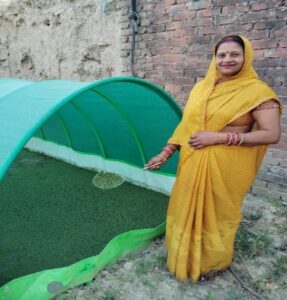 Kamini, a woman farmer who transformed her life and community through the cultivation of Azolla for livestock fodder. Kamini resides in the Rudan Kheda village of Mall block, Lucknow District of U.P. With mere 0.5 acres of land, she relies on animal husbandry as a source of income. She owns 2 buffaloes and 2 cows which she reared to sell milk and sustain her family’s expenses. Due to small landholding she had to purchase fodder for livestock from market with prices increasing over the time. Limited access to quality fodder and rising expenses posed constant obstacles to her livestock’s well-being and thereby started affecting her income. PANI conducts a project named “Democratization of Water for Livelihood and Life (DWLL)”, under which women are being empowered by enhancing their capabilities in farm and non-farm initiatives to increase their household income in progressive manner. Kamini attended one of the awareness meetings conducted by PANI, where she was intrigued by the idea of Azolla, a fast-growing, protein-rich fern that requires minimal land for cultivation.
Kamini, a woman farmer who transformed her life and community through the cultivation of Azolla for livestock fodder. Kamini resides in the Rudan Kheda village of Mall block, Lucknow District of U.P. With mere 0.5 acres of land, she relies on animal husbandry as a source of income. She owns 2 buffaloes and 2 cows which she reared to sell milk and sustain her family’s expenses. Due to small landholding she had to purchase fodder for livestock from market with prices increasing over the time. Limited access to quality fodder and rising expenses posed constant obstacles to her livestock’s well-being and thereby started affecting her income. PANI conducts a project named “Democratization of Water for Livelihood and Life (DWLL)”, under which women are being empowered by enhancing their capabilities in farm and non-farm initiatives to increase their household income in progressive manner. Kamini attended one of the awareness meetings conducted by PANI, where she was intrigued by the idea of Azolla, a fast-growing, protein-rich fern that requires minimal land for cultivation.
In December 2023, Kamini established the Azolla demo unit with support from PANI at the backyard of her house, and within 15 days, she began harvesting Azolla to feed her livestock. The impact was remarkable. The high nutritional content of Azolla feed led to improved growth rates, enhanced milk production, and overall better health for her animals. Prior to Azolla intervention, the milk fat content from her cattle ranged from 4.3% to 4.7%, fetching her a modest rate of INR 32-35 per liter. However, after incorporating Azolla into her livestock’s diet, the fat content surged to 5.7%, elevating the milk’s market value to INR 37-40 per liter. Kamini’s monthly earnings increased from approximately INR 12,000 to INR 13,500, while she saved an additional INR 2,000 by eliminating the need to purchase green fodder and grains from the market. With newfound confidence and expertise, she emerged as a trailblazer in her community, inspiring fellow women farmers to embrace innovation and entrepreneurship in animal husbandry. Her husband, once doubtful, now actively supports her endeavors, encouraging her participation in women collectives’ meetings and offering assistance, whenever needed. Through knowledge-sharing initiatives and training sessions under DWLL project, she catalyzed a wave of change that rippled across her community.
Kitchen gardens doing wonders for rural communities: Nutrition for all, livelihood and entrepreneurship for women
Sangu devi is a 32-year-old female farmer who is a resident of Ekgharwa village of Gram Panchayat Mishraulia Mafi. She has a family of four members, all involved in agricultural activities. For many years, Sangu’s family has been cultivating paddy and wheat on their two acres of land and earning marginal income. However, family’s daily consumption of vegetables amounted to INR 80-100 when bought from market, which is monthly expense of INR 2,500-3,000. Thus, they many times used to cut down on their consumption of vegetables as much possible to save money. This led to lack of nutrition and consequently, health issues in family which further raised their expenses.
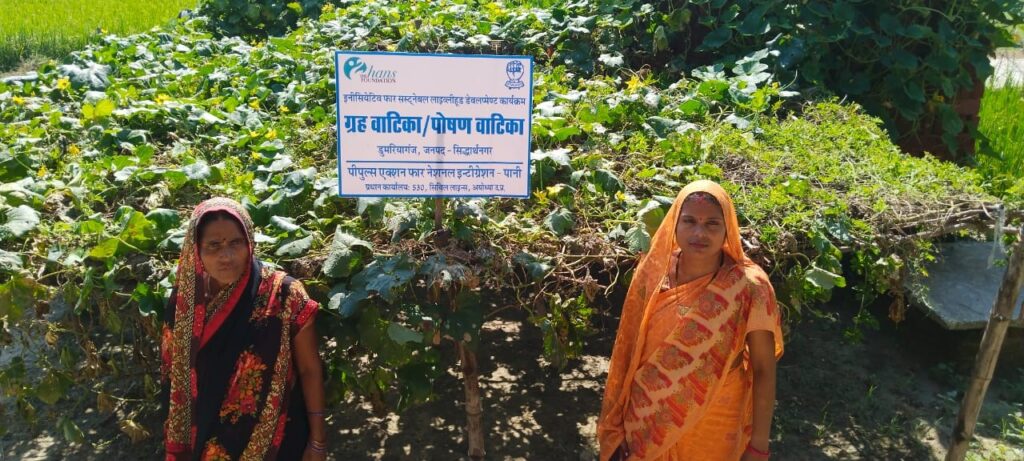 Under PANI’s Initiative for Sustainable Livelihood Development (ISLD) project being implemented across 100 gram panchayats of Dumariaganj and Bhanwapur blocks of Siddharth Nagar district in Uttar Pradesh, farmers are trained on sustainable agricultural practices, water conserving techniques and supported through government entitlements. ISLD team visited Sangu’s village in March 2023 and Sangu attended the meeting where ISLD team shared the process of setting up kitchen gardens with the community. Sangu liked the idea and explored more through ISLD representatives. Thereafter, from July 2023 onwards, the ISLD team supported Sangu to set up her kitchen garden. Sangu was taken through complete process of crop management and maintenance of kitchen garden by ISLD team. Within a few months, the crops were ready with vegetables and Sangu was delighted with the results. From thereon, Sangu started to sell vegetables from her kitchen garden after keeping sufficient quantities for her family’s consumption. With first crop cycle itself, Sangu was sure she does not need to spend any money in buying vegetables as the garden was generating surplus vegetables. She has been able to save INR 2,500-3,000 – per month and at the same time, her family is enjoying fresh and nutritious vegetables at home. Money so saved is now being used for children’s education and other household expenses which has further strengthened the family’s financial as well as social position. Sangu’s confidence has no bounds now and she is preparing to consistently sell a substantial part of her vegetable produce in market regularly aspiring to add to her monthly income. She shares her experience with other people of the village and encourages them to set up kitchen gardens.
Under PANI’s Initiative for Sustainable Livelihood Development (ISLD) project being implemented across 100 gram panchayats of Dumariaganj and Bhanwapur blocks of Siddharth Nagar district in Uttar Pradesh, farmers are trained on sustainable agricultural practices, water conserving techniques and supported through government entitlements. ISLD team visited Sangu’s village in March 2023 and Sangu attended the meeting where ISLD team shared the process of setting up kitchen gardens with the community. Sangu liked the idea and explored more through ISLD representatives. Thereafter, from July 2023 onwards, the ISLD team supported Sangu to set up her kitchen garden. Sangu was taken through complete process of crop management and maintenance of kitchen garden by ISLD team. Within a few months, the crops were ready with vegetables and Sangu was delighted with the results. From thereon, Sangu started to sell vegetables from her kitchen garden after keeping sufficient quantities for her family’s consumption. With first crop cycle itself, Sangu was sure she does not need to spend any money in buying vegetables as the garden was generating surplus vegetables. She has been able to save INR 2,500-3,000 – per month and at the same time, her family is enjoying fresh and nutritious vegetables at home. Money so saved is now being used for children’s education and other household expenses which has further strengthened the family’s financial as well as social position. Sangu’s confidence has no bounds now and she is preparing to consistently sell a substantial part of her vegetable produce in market regularly aspiring to add to her monthly income. She shares her experience with other people of the village and encourages them to set up kitchen gardens.
Solar Jal Minar Revolution empowering villages

Farm mechanization, a smart way to optimize the use of natural resources:
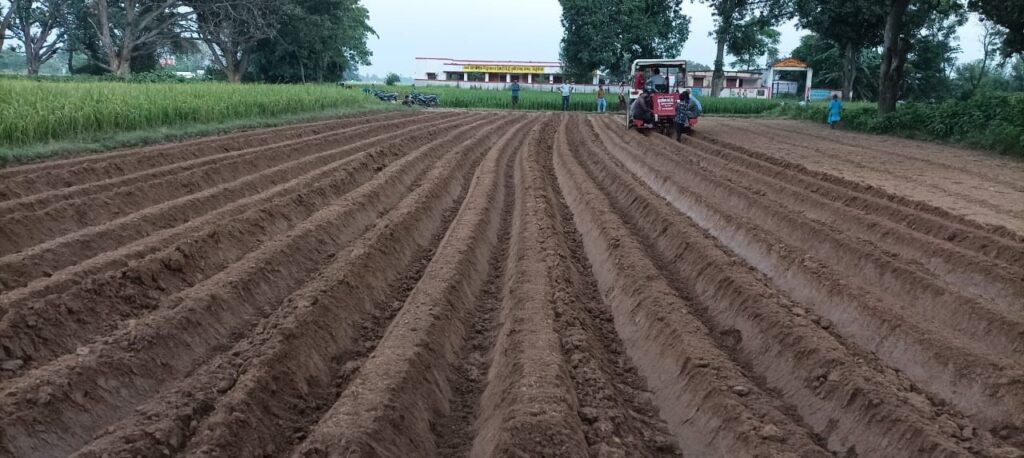


Seeds of success: Transforming agriculture with Direct Seeded Rice (DSR)
In the lush fields of rural India, where paddy cultivation has long been a traditional practice, a quiet revolution is underway. This transformation in rice cultivation is marked by simple yet revolutionary technique: Direct Seeded Rice (DSR). We bring to you a story of a 30-years old farmer Harivansh Gopal, resident of Gram Panchayat Bijora in Siddharthnagar District of Uttar Pradesh. Harivansh like many farmers in his village, used to rely on traditional transplanting methods for rice cultivation. It was a labor-intensive process that required significant time, labor, and water. However, his journey took a new turn when he learned about DSR through PANI’s project team under Initiative for Sustainable Livelihood Development (ISLD) project being implemented in his village. Intrigued by the promise of DSR to save water, reduce labor, and improve yields, Harivansh decided to give it a try. With guidance from ISLD team, he prepared his 1-acre of field and adopted the DSR technique for the upcoming rice season.
The results were nothing short of transformative. By directly sowing pre-germinated rice seeds into the moist soil, Harivansh eliminated the need for labor-intensive transplanting and significantly reduced water usage. Moreover, the early establishment of rice plants through DSR helped suppress weeds, leading to healthier crops and higher yields. His rice production was 5 quintals more than what he used to get through traditional method
Harivansh is recognized as a pioneer of DSR in his community. His success has not only improved his own livelihood, but inspired by his success more farmers are now embracing DSR with each passing season, leading to more sustainable and efficient rice cultivation practices in the village.

PANI in Media







